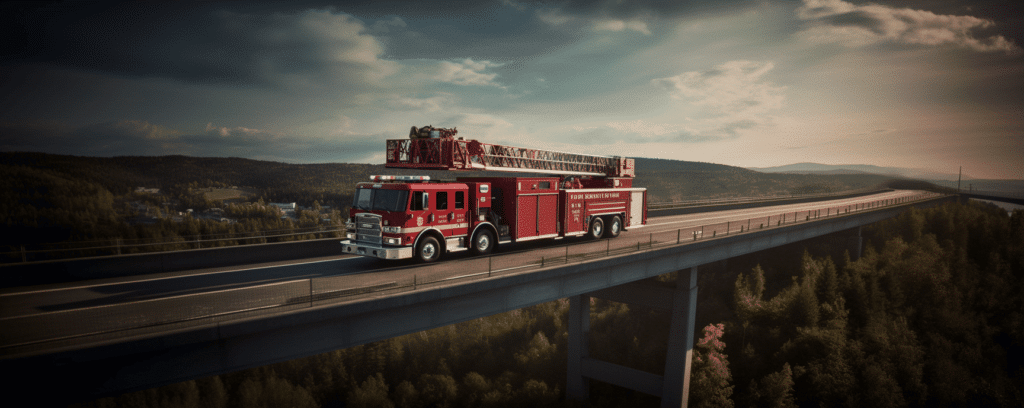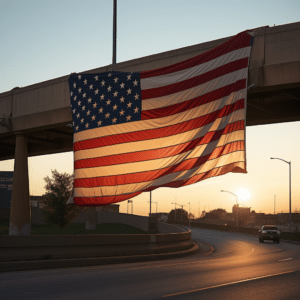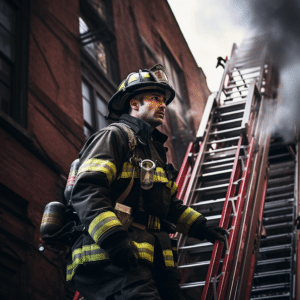Why Are There Fire Trucks on the Overpasses Today? – Explained
Last updated Friday, October 18th, 2024

Have you ever seen fire trucks on overpasses and wondered, “why are there fire trucks on the overpasses today?” The reasons might surprise and fascinate you, as they serve an essential purpose in firefighting, rescue, and honoring fallen heroes. Let’s uncover the various reasons for fire trucks on overpasses, unique firefighter funeral traditions, fire safety and community awareness, and the impressive features of fire trucks that make them indispensable tools in saving lives.
Fire Trucks on Overpasses: Reasons and Events
Fire trucks on overpasses are more than just a spectacle; they serve a variety of critical functions. From paying tribute to fallen firefighters to engaging in important training drills for fighting fires, these unique events showcase the dedication and commitment of our brave firefighters. Next time you see fire trucks on overpasses, remember that they could be honoring a courageous firefighter who lost their life in the line of duty, or honing vital skills that save lives every day.
What exactly are firefighters doing on overpasses? Activities can range from saluting the procession of fallen comrades, practicing hose line deployment, to swiftly responding to emergencies. We’ll examine each of these significant reasons and events in detail.
Honoring Fallen Firefighters
Firefighters demonstrate their admiration for their fallen colleagues by gathering on overpasses during funeral processions. This touching tradition began as a way to honor and pay respects to fallen firefighters and has become a symbol of solidarity and reverence within the firefighting community. Firefighters, family members, and grateful citizens gather on overpasses to show their support and gratitude for the sacrifice made by the fallen firefighter.
The gathering on overpasses is a meaningful way for firefighters to pay their respects and show tribute to their fallen comrades who made the ultimate sacrifice in the line of duty. As we witness these solemn gatherings on overpasses today, we are reminded of the bravery and dedication of those who risk their lives daily to protect ours.
Training Drills and Exercises
Additionally, fire trucks may be stationed on overpasses for essential training drills and exercises. These practical scenarios offer firefighters an invaluable opportunity to refine their emergency response, fire suppression, and rescue operation skills.
Training on overpasses offers several advantages for firefighters, such as practicing aerial ladder operations, responding to emergencies on highways, and coordinating with other emergency responders. The location on an overpass allows firefighters to simulate real-life scenarios, which helps them stay prepared for various emergency situations.
Emergency Response
In some cases, fire trucks may be stationed on overpasses to swiftly respond to emergencies or provide assistance. The elevated position of an overpass offers fire trucks unobstructed access to incident locations, enabling them to rapidly and effectively reach the scene.
To ensure the safety of emergency personnel and the public, specialized units within the fire department or law enforcement agencies manage traffic during such events. Emergency vehicles, like fire trucks, equipped with powerful pumps and elevated master stream devices, are prepared to suppress fires and respond to various situations, ensuring that fire departments can carry out their duties and provide prompt assistance.
Firefighter Funeral Traditions
Firefighter funerals, while solemn, also uphold unique traditions that pay homage to the fallen heroes and their service. These customs encompass the ringing of 20 bells, the presentation of a folded flag to the bereaved family, and a firefighter escort during the funeral procession.
Let’s explore each of these heartfelt traditions and their significance.
The Ringing of 20 Bells

This poignant tradition dates back to the early days of firefighting when firefighters used a brass bell to alert their colleagues that a fire had been extinguished, honoring their heroic efforts. Today, the tolling of the bell remains a solemn ceremony that is broadcasted over fire alarm circuits as a sign of respect and tribute.
Presentation of Folded Flag
The process of presenting a folded flag at a firefighter’s funeral is a moving tribute of lasting importance to the firefighter’s family. The flag is placed on a closed casket, with the union blue field at the head and over the left shoulder of the deceased. It is then folded into a triangle, symbolizing the original 13 colonies.
This meaningful gesture is presented to the deceased’s family on behalf of the nation and the U.S. President, paying tribute to their bravery and devotion. The folded flag serves as a keepsake for the family, honoring the memory of their loved one who paid the ultimate sacrifice in the line of duty.
Firefighter Escort
Firefighter escorts have a special role during funeral processions, accompanying the casket to reverently honor their fallen comrade. The esteemed honor guard or escort may include the department’s fire engines, and some departments may use a dignified caisson or wagon to pull the coffin, which is typically adorned with a flag-drape.
Firefighters stand in a ring around the ambulance or hearse carrying the fallen firefighter’s body, standing silently in tribute to their fallen comrade. As we witness these solemn escorts, we are reminded of the selflessness and dedication of those who risk their lives daily to protect ours.
Fire Safety and Community Awareness
Enhancing fire safety and community awareness plays a pivotal role in preventing fires and safeguarding our communities. This includes measures such as brush fire prevention, correct usage of fire extinguishers, and backing local fire departments.
By staying informed and taking proactive steps, we can contribute to a safer environment for everyone.
Brush Fire Prevention and Preparedness
To ensure brush fire prevention and preparedness, it is essential to be mindful of avoiding activities that involve fire or sparks in hot, dry, and windy conditions. Maintaining a fire-safe zone around your home, investing in prevention measures, and creating defensible space are crucial in reducing fire risks.
Stay informed by monitoring local news and weather reports, signing up for emergency alerts, and following local fire departments on social media. By staying vigilant and taking preventive measures, we can significantly reduce the risk of brush fires and protect our homes and communities.
Fire Extinguishers and Equipment
Knowing how to use fire extinguishers and other equipment can help prevent small fires from becoming larger emergencies. To use a fire extinguisher effectively, follow these steps:
- Pull the pin.
- Aim at the base of the fire.
- Squeeze the handles.
- Sweep from side to side.
It is also important to familiarize yourself with the type of fire extinguisher you have and its appropriate use. Regularly inspect and maintain the extinguisher to ensure it is in proper working condition, and take the time to read the instructions and understand how to operate it correctly.
Supporting Your Local Fire Department
Supporting your local fire department is an essential way to improve fire safety in your community. You can show your support by making donations, volunteering your time, and attending events hosted by the fire department.
Donating to a local fire department has numerous advantages, such as:
- Tax deductions
- Showing your support to the community
- Financial savings
- Enhanced safety
Volunteer opportunities, such as administrative work and community outreach, allow you to play a vital role in assisting the fire department with their operations and services.
Unique Features of Fire Trucks
Fire trucks are equipped with distinctive features that render them essential in rescue operations. These remarkable attributes comprise:
- Powerful pumps
- Hose reels
- Ladders
- High visibility
These firefighting features also serve as valuable tools for rescue missions.
We will now dissect each of these remarkable features and their importance.
Powerful Pumps and Hose Reels

- Centrifugal pumps
- Horizontal split case pumps
- Vertical split case pumps
- Vertical in-line pumps
- Vertical turbine pumps
- End suction pumps
Hose reels in a fire truck help firefighters in the following ways:
- They allow for quick and easy distribution of hose lines at the site of a fire.
- They enable firefighters to effectively extinguish the flames.
- Fire truck hoses are crafted from a combination of materials chosen for their exceptional strength and flexibility, ensuring durability and protection against abrasion.
Ladders and Aerial Equipment
Ladders and aerial equipment enable firefighters to reach high places and rescue individuals from elevated locations. Extension ladders, roof ladders, hook ladders, and scaling ladders are all vital for successful firefighting.
Aerial ladders offer several advantages compared to regular ladders, such as:
- Being shorter, more economical, smaller, and lighter
- Featuring different breathing air systems or a bucket at the end of the ladder
- Reaching an impressive height of up to 100 feet, providing firefighters with access to upper floors and rooftops during rescue operations.
Emergency Vehicle Visibility
Emergency vehicle visibility, often through the use of red or other bright colors, helps ensure fire trucks are easily seen and recognized during emergencies. The bright and visible color of a fire truck, typically red, plays a big role in its visibility, while reflective striping further enhances its visibility, making it easier for drivers of other vehicles to spot.
Fire trucks use various lighting systems to enhance visibility, making rescues safer and more successful. These include:
- Warning light systems
- LED scene lighting systems
- Pole-mounted scene lights
- Helmet lights
These lighting systems ensure that fire trucks arrive on the scene promptly and safely, ready to save lives.
Frequently Asked Questions
Why are there fire trucks on overpasses?
Fire trucks may be seen on overpasses to honor, train, or respond to emergencies, providing us with an inspiring reminder of the courage and commitment of first responders.
What are some unique traditions at firefighter funerals?
Firefighter funerals have unique and heartfelt traditions such as ringing 20 bells to honor the fallen, presenting a folded flag to the family, and having a firefighter escort to pay respect. These traditions demonstrate the deep respect firefighters and their families have for each other.
How can I support my local fire department?
Show your support for your local fire department by donating, volunteering, and attending events. Make a difference in your community today!
What unique features do fire trucks have?
Fire trucks are equipped with powerful pumps, hose reels, ladders and high visibility lighting to aid in firefighting and rescue missions, making them truly unique.
How can I stay safe from brush fires?
Stay informed, avoid fire and sparks, maintain a fire-safe zone around your home, prevent fires, and create defensible space; these actions are essential for keeping safe from brush fires.











